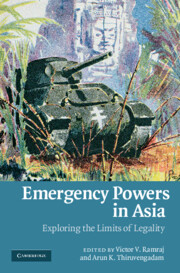Book contents
- Frontmatter
- Contents
- List of contributors
- Preface
- 1 Introduction: emergency powers and constitutionalism in Asia
- PART I Perspectives from legal and political theory
- PART II Postcolonial and post-conflict transitions
- PART III Emergencies, executive power and constitutional order
- PART IV The role of the courts
- 14 Constitutionalised emergency powers: a plague on Asian constitutionalism?
- 15 Political emergencies in the Philippines: changing labels and the unchanging need for legitimacy
- 16 Islamism as a response to emergency rule in Pakistan: the surprising proposal of Justice A. R. Cornelius
- 17 Asian judiciaries and emergency powers: reasons for optimism?
- Index
- References
16 - Islamism as a response to emergency rule in Pakistan: the surprising proposal of Justice A. R. Cornelius
from PART IV - The role of the courts
Published online by Cambridge University Press: 04 August 2010
- Frontmatter
- Contents
- List of contributors
- Preface
- 1 Introduction: emergency powers and constitutionalism in Asia
- PART I Perspectives from legal and political theory
- PART II Postcolonial and post-conflict transitions
- PART III Emergencies, executive power and constitutional order
- PART IV The role of the courts
- 14 Constitutionalised emergency powers: a plague on Asian constitutionalism?
- 15 Political emergencies in the Philippines: changing labels and the unchanging need for legitimacy
- 16 Islamism as a response to emergency rule in Pakistan: the surprising proposal of Justice A. R. Cornelius
- 17 Asian judiciaries and emergency powers: reasons for optimism?
- Index
- References
Summary
Introduction
Few countries can claim as rich and varied an experience of extraordinary rule as Pakistan. Pakistan has been governed under either emergency rule or martial law for the greater part of its history. Pakistani lawyers and intellectuals have given a great deal of thought to the problems posed by these kinds of extraordinary rule and their effect on the rule of law. In this Chapter, I will discuss how one famous and thoughtful liberal judge in Pakistan responded to the repeated imposition of emergency rule, martial law and guided democracy during his years on the bench. I will describe how he came up with a most surprising proposal for strengthening the rule of law so that extraordinary rule was either unnecessary or, when imposed, restrained. The judge in question is A. R. Cornelius, a famous Christian justice of the Pakistani Supreme Court – renowned for his repeated defence of the position that judges must play an active role in defending fundamental rights against executive overreach. His proposal was to Islamise the Pakistani legal system.
Cornelius has long stood as a hero to liberals in Pakistan and abroad for his courageous defence of fundamental rights during periods of extraordinary rule. He is particularly admired for dissents he wrote during Pakistan's first state of emergency and first martial law. In these dissents, Cornelius decried his colleagues' unwillingness to challenge executive assertions of power.
- Type
- Chapter
- Information
- Emergency Powers in AsiaExploring the Limits of Legality, pp. 436 - 465Publisher: Cambridge University PressPrint publication year: 2009
References
- 2
- Cited by



